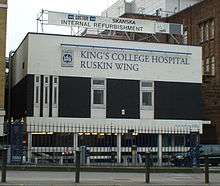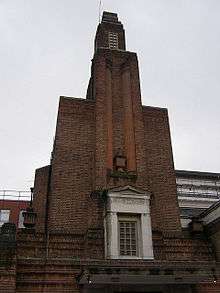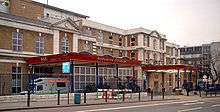King's College Hospital
| King's College Hospital (KCH) | |
|---|---|
|
King's Health Partners King's College Hospital NHS Foundation Trust | |
 King's College Hospital, Ruskin Wing | |
| Geography | |
| Location | Denmark Hill, London, England, United Kingdom |
| Organisation | |
| Care system | NHS |
| Hospital type | Teaching |
| Affiliated university | King's College London / KCLMS |
| Services | |
| Emergency department | Level 1 Trauma Center |
| Beds | 950[1] |
| Speciality | Liver Disease, Neurology, Neurosurgery, Dentistry, Trauma (medicine) |
| History | |
| Founded | 1840, current site 1909 |
| Links | |
| Website |
www |
| Lists | Hospitals in England |
King's College Hospital NHS Foundation Trust is an acute care facility in Denmark Hill, Camberwell in the London Borough of Lambeth, referred to locally and by staff simply as "King's" or abbreviated internally to "KCH". It serves an inner city population of 700,000 in the London boroughs of Southwark and Lambeth but also serves as a tertiary referral centre in certain specialties to millions of people in southern England. It is a large teaching hospital and is, with Guy's Hospital and St. Thomas' Hospital, the location of King's College London School of Medicine and one of the institutions that comprise the King's Health Partners, an academic health science centre. The current chief executive is Tim Smart.
Early history

King's was originally opened in 1840 in the disused St Clement Danes workhouse in Portugal Street close to Lincoln's Inn Fields and the College itself. It was used as a training facility where medical students of King's College London could practice and receive instruction from the college's own professors. The surrounding area there was composed of overcrowded slums characterised by poverty and disease. Within two years of opening, the hospital was treating 1,290 inpatients in 120 beds, with two patients sharing a bed by no means unusual. The main contractor for the new hospital was Lucas Brothers.[3]
Pioneer of aseptic surgery Joseph Lister performed the first major elective surgery under strict antiseptic conditions in 1877. He helped propel the hospital to have a surgical unit comparable with the best in Europe.
In the first years of the 20th century, demographic changes saw a decrease in the number of patients requiring treatment in the centre of London, and an increase of patients from further afield - notably Camberwell, Peckham and Brixton which were then suburbs on the outskirts of London. Following an Act of Parliament in 1904, a foundation stone was laid for the new hospital, designed by William Pite, in 1909 at its present site at Denmark Hill, south of the River Thames. The move to Denmark Hill provided the hospital with a greenfield-site nearer to its patients. The building itself incorporated modern design principles to encourage adequate ventilation, used electric clocks throughout, contained only the second internal phone installation in the U.K. at the time, and generated its own power through the use of diesel engines.

Pre-clinical training of medical students remained the responsibility of King's College, whilst advanced medical training took place at the hospital under the auspices of a newly formed King's College Hospital Medical School. During the period of World War I, a large proportion of the hospital was used for military purposes. A dental school was established at the same site in 1923. During this time most patients were still poor and highly vulnerable to contagious diseases such as tuberculosis. In 1937 the private Guthrie wing was established with a donation from the Stock Exchange Dramatic and Operatic Society for wealthier patients to enjoy less crowded wards. During the Second World War the hospital was used for treating casualties of air raids, and was fortunate never to sustain a major direct hit.
Modern history
Following the creation of the National Health Service in 1948, the hospital was granted Teaching Hospital status. In 1974 the NHS re-organisation saw King's become the centre for all health services management in its catchment area. The hospital's medical school was reunited with King's College in 1983 to form King's College School of Medicine and Dentistry. A purpose-built medical education centre, the Weston Education Centre, was built in 1997 and contains a medical library as well as hosting conferences, symposia, and professional training events as well as containing public access computer rooms for students. In 1998 King's College School of Medicine and Dentistry merged with the United Medical and Dental Schools (UMDS) of Guy's and St Thomas's Hospitals to form Guy's, King's and St Thomas's School of Medicine, commonly abbreviated to "GKT". In 2002 the Golden Jubilee wing was completed, which hosts a number of outpatient clinics as well as therapy suites for speech and language, occupational therapy and physiotherapy. In 2008 King's College Hospital was the first UK hospital to appoint a Chief Executive from the private sector with the appointment of Tim Smart from BT Global Services UK.[4]
In December 2013 it was announced that a proposed merger with Guy’s and St Thomas’ and South London and Maudsley NHS Foundation Trusts had been suspended because of doubts about the reaction of the Competition Commission.[5]
The Trust took over the management of Princess Royal University Hospital in October 2013 after the dissolution of the South London Healthcare NHS Trust. Over Christmas 2013 8 patients there waited on trolleys for more than 12 hours for admission, the largest number of trolley waits in England.[6]
Commercial ventures
The trust used its commercial arm, KCH Management, to open a clinic in Abu Dhabi in November 2014.[7] It is working with investment management company Ashmore Group to set up a hospital in Dubai due to open in 2018. It has an agreement with Indo UK Healthcare Private to create an institute of health in New Chandigarh where a 500 bed hospital, trauma centre and day surgery centre will also be built. The trust will be paid by a fixed fee, profit share arrangements, equity stakes and consultancy work and hopes to generate £40m over 15 years.[8]
The trust is a partner in Viapath a London-based provider of pathology services jointly owned with Serco, and Guy's and St Thomas' NHS Foundation Trust.[9]
Performance
In March 2015 the Trust forecast a deficit for the financial year of £42.5 million. It has a very large backlog of patients waiting more than 18 weeks for treatment. Monitor launched an investigation into the trust because of ‘long standing problems’ at Princess Royal University Hospital in March 2015. Financial problems are attributed to urgent improvements to the quality of care there, including increasing the nurse-to-patient ratio by recruiting 260 new nurses.[10]
The trust now expects to finish 2015-16 with a deficit of more than £65 million partly as a result of changes to the NHS tariff.[11]
Facilities
It was one of the first trusts to introduce a comprehensive public Wi-Fi service. The basic service costs £4.50 a day but is free on the chidren's wards.[12]
Tertiary care specialities

It is one of the biggest provider of specialised services in England, which generated an income of £308.8 million in 2014/5.[13]
King's Liver Unit is the most comprehensive service of its kind in the world, with a strong interest in paediatric liver cancers. King's also operates the largest liver transplantion programme in Europe.
There is a great deal of expertise within King's Department of Neurology/Neurosciences. There is a large outpatient movement disorder clinic, specialising in multidisciplinary team management of Parkinson's disease, dystonia, progressive supranuclear palsy, and related diseases. It is one of only five centres in the European Union designated a "Centre of Excellence" by the National Parkinson Foundation. In 1995 Professor Nigel Leigh established the UK's first specialist Motor Neurone Disease Care & Research Centre, a model of care which has since been reproduced at 13 other centres throughout the country. The emphasis is on rapid diagnosis, management by a multidisciplinary team, with a strong focus on basic science research and clinical trials.
The hospital is also home to the only dedicated diverticular disease clinic.[14]
Location
On the opposite side of the A215 (Denmark Hill) is the Maudsley psychiatric hospital, which has close links with King's. The Institute of Psychiatry is nearby and many doctors at King's collaborate with their academic colleagues in carrying out research in conditions such as Parkinson's disease and Motor neurone disease. The Denmark Hill Campus of King's College London is also on Denmark Hill although the main Strand campus is further along the 68 bus route at Aldwych. The nearest railway station is Denmark Hill railway station. The hospital is near Ruskin Park on the other side of a railway line.
Media
The hospital featured in Channel 4's documentary 24 Hours in A&E first broadcast on 11 May 2011. The documentary focuses on the hospital's accident and emergency department and is filmed using 70 different cameras strategically placed to capture the workings of the department without interference.[15]
Notable alumni
- James W. Black - 1924-2010 Nobel Prize for Medicine winner 1988 for his contribution to discoveries of important principles for drug treatment
- William Bowman - 1837-1865 Ophthalmic surgeon, helped found Ophthalmological Society of the United Kingdom
- John Leonard Dawson - 1932-1999 Serjeant Surgeon to the Royal Household of the United Kingdom
- Reita Faria - Indian model and Miss World 1966
- William Fergusson - 1840-1877 Surgeon, introduced practice of conservative amputation
- David Ferrier - 1871-1908 Pioneering experimental neurologist
- Joseph Lister - 1887-1893 Pioneer of antiseptic surgery
- Victor Negus - 1887-1974 Laryngologist and comparative anatomist
- Audrey Smith (1915-1981), cryobiologist
- Dhani Ram Prem (1904–1979), the first Asian councilor of Birmingham and winner of Padma Shri[16]
See also
- Healthcare in London
- List of hospitals in England
- King's Health Partners
- List of NHS trusts
- John Cutting (psychiatrist)
- Guy's Hospital
- Maudsley Hospital
- St Thomas' Hospital
- Francis Crick Institute
References
- ↑ "NursingNetUK: King's College Hospital NHS Foundation Trust". Retrieved 2008-11-04.
- ↑ "HM Queen Elizabeth opens King's". Nightingaleassociates.com. 2003-07-25. Retrieved 2011-07-13.
- ↑ Charles Thomas Lucas at Oxford Dictionary of National Biography
- ↑ http://www.ethosjournal.com/home/item/290-separate-worlds?
- ↑ "Trust super-merger shelved". Health Service Journal. 5 December 2013. Retrieved 5 December 2013.
- ↑ "Eight patients left on trolleys for over 12 hours". Health Service Journal. 9 January 2014. Retrieved 25 January 2014.
- ↑ "The NHS underplays how valuable its expertise is internationally". Health Service Journal. 21 May 2015. Retrieved 20 June 2015.
- ↑ "Leading London trust to open India and Dubai hospitals". Health Service Journal. 20 November 2015. Retrieved 19 December 2015.
- ↑ "Viapath - a New Brand, Same Commitment to Transform Pathology Services". Select Science. 9 May 2014. Retrieved 28 May 2014.
- ↑ "Monitor investigates major London trust". Health Service Journal. 5 March 2015. Retrieved 28 March 2015.
- ↑ "Rollover tariff trusts expect massive deficits". Health Service Journal. 26 May 2015. Retrieved 20 June 2015.
- ↑ "Supplement: Can I watch Netflix from my hospital bed?". Health Service Journal. 28 October 2015. Retrieved 29 November 2015.
- ↑ "Analysed: The biggest NHS providers of specialised services". Health Service Journal. 16 October 2015. Retrieved 16 November 2015.
- ↑ Kvasnovsky, Charlotte L.; Adams, Katie; Papagrigoriadis, Savvas (April 2015). "Diverticular disease as a chronic gastrointestinal condition". European Journal of Gastroenterology & Hepatology 27 (4): 442–448. doi:10.1097/MEG.0000000000000304. PMID 25874519. Retrieved 28 August 2015.
- ↑ "Channel 4 Documentaries - 24 Hours in A&E". Retrieved 15 June 2011.
- ↑ "Old stories, new histories". The Iron Roo. 28 October 2013. Retrieved June 23, 2015.
External links
| Wikimedia Commons has media related to King's College Hospital. |
- South London Press article: 'Campaigners delighted with plans for mental health area at King's'
- The history of King's College Hospital
- Official site of the National Health Service
| ||||||||||||||
Coordinates: 51°28′05″N 0°05′38″W / 51.468°N 0.0938°W
